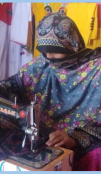Aid to Uprooted People in Pakistan project

Duration: August 2016 – December 2021
Budget: Total €34 million, EU Contribution €22 million, BMZ Contribution €12 million
Location: Khyber, Kurram, Orakzai, North Waziristan and South Waziristan, (Khyber Pakhtunkhwa Province)
Implementing Partners:
Component 1: German Corporation for International Cooperation (GIZ)
Component 2: German Credit Institute for Reconstruction (KfW) & implemented by Sarhad Rural Support Programme (SRSP)
Aid to Uprooted People in Pakistan’ is a five years project with the overall objective to facilitate the reintegration of temporally displaced persons by creating a favourable environment for their return with sustainable and needs oriented measures in the field of long-term reconstruction and rehabilitation.
The challenge
The Government of Pakistan launched numerous operations between 2004 and 2016 to uproot the militants in the Federally Administered Tribal Areas (FATA, which resulted in displacement of more than 3.3 million people; disrupted livelihoods and local government structures; and destroyed infrastructure. The return of the displaced population to their areas of origin is in its closing phase now, but the region lags behind the rest of Pakistan in all socio-economic indicators. In its efforts to rebuild the region and achieve long-term stability and peace the Government of Pakistan approved the merger of FATA with the Khyber Pakhtunkhwa Province on May 31st, 2018.
How do we address the challenge?
The project applies a multi-sector approach in uplifting the returning communities of the merged districts. Community needs are identified through a distinct community mobilisation involvement process. The project recognises active participation of communities as key to participatory, equitable, accountable and sustainable development in the region. It aims to support and sustain community-driven local development initiatives in selected areas to create a favourable socio-economic environment for returning temporally displaced persons (TDPs). The first component of the project aims to improve the service delivery capacity of the Merged Districts administration and assist the reform process in the region. The second component aims to support and sustain community-driven local development initiatives in selected areas to create a favourable socio-economic environment for returning TDPs.
Support to policy
The EU supports the Government of Pakistan in its objectives for long-term stability and peace in the region. The project works in close coordination with the Government for policy level interventions and in parallel the project uplifts the communities in the target districts.
All interventions areas and activities are endorsed by the Government after consultation meetings to avoid any duplication of efforts between the implementing partners as well as the Government’s own Annual Development Plan. This also helps in building synergies and complements the efforts of all partners working in the merged districts.
What can we learn from this project?
In a highly volatile project context after the FATA Merger, ongoing dialogue with government counterparts has proved crucial to ensure that all project activities are aligned with government priorities.
EU in Pakistan
The European Union (EU) funds projects and programmes around the world in order to help addressing global and local challenges. The reduction of poverty and the respect of fundamental rights and freedoms are key objectives in this context.
In Pakistan, the EU is committed to a stable, democratic and pluralistic country that respects human rights and benefits from its full economic potential by supporting sustainable and inclusive development for all its citizens. The EU provides Pakistan with about €100 million annually in grants for development and cooperation. Among other issues, the EU supports Pakistan in its efforts to tackle poverty, increase education, promote good governance, human rights, rule of law and ensure sustainable management of natural resources. EU-funded projects are covering all of Pakistan with a special focus on Sindh and Balochistan.
The collaboration between the European Union and Pakistan is grounded in the Strategic Engagement Plan (SEP) signed in 2019. Areas of cooperation under the SEP include peace and security, democracy, rule of law, human rights, and migration but also sectors such as energy, climate change and science and technology.
The EU is one of Pakistan’s largest trading partners. The EU supports Pakistan’s integration into the world economy and its sustainable economic development, namely by granting it preferential access to the European single market under the GSP+ system since 2014. Under this scheme almost 80% of Pakistan’s exports enter the EU duty and quota free. In 2018, Pakistani exports to the EU were worth €6.9 billion.
In order to enjoy the trade preferences under GSP+, Pakistan needs to demonstrate progress on the implementation of 27 international conventions on human rights, good governance, labour rights and environmental protection.
Delegation of the European Union to Pakistan,
House 9, Street 88, G-6/3, Islamabad
Phone: +92 51 227 1828, Fax: +92 51 282 2604
Email: Delegation-Pakistan@eeas.europa.eu
To report any irregularities contact us on DELEGATION-PAKISTAN-IRREGULARITIES@eeas.europa.eu





